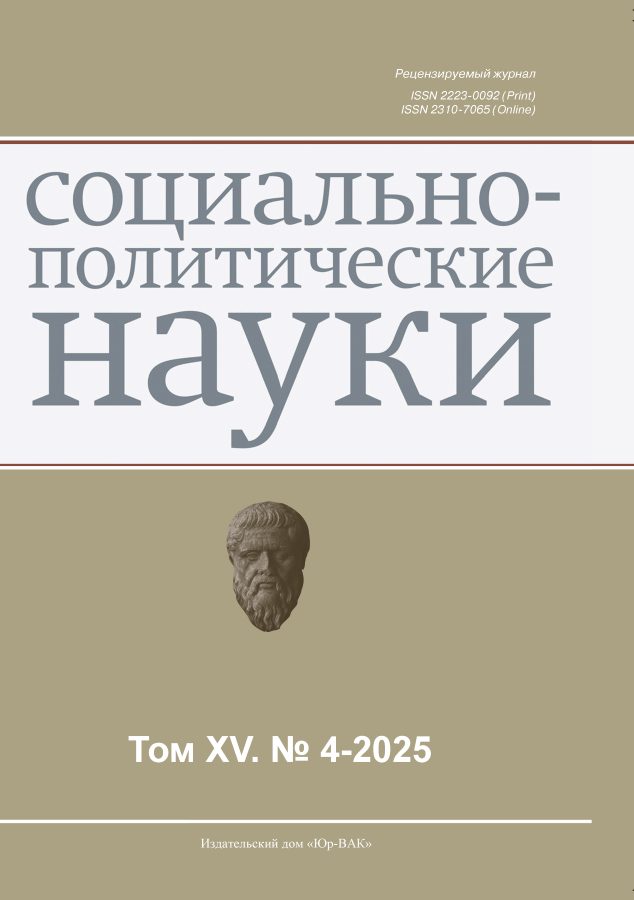Modern Kazakhstan: problems of forming a national identity
- Authors: Buluktaev Y.O.1
-
Affiliations:
- Institute of Philosophy, Political Science and Religious Studies of the Ministry of Science and Higher Education of the Republic of Kazakhstan
- Issue: Vol 15, No 4 (2025)
- Pages: 58-67
- Section: II Drobizhev Readings – 2025
- URL: https://journals.eco-vector.com/2223-0092/article/view/693222
- DOI: https://doi.org/10.33693/2223-0092-2025-15-4-58-67
- EDN: https://elibrary.ru/YEMZAW
- ID: 693222
Cite item
Abstract
The article examines the problems of transformation of national identity in the Republic of Kazakhstan. Identification processes in post-Soviet Kazakhstan are analyzed, forming a new identity under the influence of both external and internal factors of state development. In these conditions, a national identity can be a factor in the positive inclusion of an individual in the activities of the state, the development of activity in establishing social ties and a reasonable attitude to resources. Attention is focused on the competition of two types of identification projects – the formation and strengthening of Kazakhstani identity on the principle of citizenship and on the principle of ethnicity. The contradiction of ethnocultural and civic modality of identification processes is a fundamental contradiction of nationwide identity. The purpose of the study is to establish and identify the features of the formation of a national identity in Kazakhstani society. As a result of the study, the following conclusions were obtained: 1) the foundation of Kazakhstani identity and unity – national values based on cultural, ethnic, linguistic and religious diversity; 2) Kazakhstani identity and unity is a continuous generational process. It is based on the fact that every citizen, regardless of ethnic origin, connects his fate and future with Kazakhstan; 3) Kazakhstanis in most cases prefer ethnic and religious identity. Civic identity is mostly declarative and included at the primary level of self-perception.
Full Text
About the authors
Yury O. Buluktaev
Institute of Philosophy, Political Science and Religious Studies of the Ministry of Science and Higher Education of the Republic of Kazakhstan
Author for correspondence.
Email: Buluktaev49@mail.ru
ORCID iD: 0000-0002-5777-8716
Dr. Sci. (Polit.), Associate Professor, chief researcher
Kazakhstan, AlmatyReferences
- Burova E.E. Sociological dimension of religious identity in the context of ideological pluralism. In: Formation of Kazakhstani identity in the context of the tasks of modernization of public consciousness. Almaty: IFPR KN MES RK, 2020. Book 3. Pp. 646–647.
- Vodolazhskaya T. Civil identity. Educational Policy. 2010. No. 5-6. Pp. 140–142. (In Rus.)
- Yesengarayev E.Zh. Identification trends and problems of Kazakhstani society. In: Ethnopolitics and identity in Kazakhstan. Collection of works of the international scientific-practical conference. M.S.-A. Shaikemelev (gen. ed.). Almaty: IFPR KN MNVO RK, 2024. Part 1. P. 161.
- Eshpanova D.D., Smailova U.E. National identity of Kazakhstan in the cultural dimension. In: Formation of Kazakhstani identity in the context of the tasks of modernization of public consciousness. Almaty: IFPR KN MES RK, 2020. Book 3. P. 407.
- Kadyrzhanov R.K. Cultural integration as a factor in national construction. In: Formation of Kazakhstani identity: problems and prospects. Collection of materials of the International scientific-practical conference. Almaty: Institute of Philosophy, Political Science and Religious Studies, 2019. P. 142.
- Kordonsky S. Power markets: Administrative markets of the USSR and Russia. Moscow: OGI, 2000. Pр. 188–190.
- Kushkumbayev S.K. Central Asian integration in the context of history and geopolitics. In: Integration processes in Eurasia: Political and legal aspect. Almaty: Iskander, 2003. P. 20.
- Malinin G.V., Dunayev V.Yu. et al. Assessment of the level of civil self-identification of the population of the Republic of Kazakhstan. Scientific and analytical report. Almaty: Institute of Philosophy of the Academy of Sciences of the Republic of Kazakhstan, 1997. P. 11.
- Malinin G. Features of identification processes in Kazakhstan: analysis and assessment of prospects. In: Formation of civil society in the countries of Central Asia. Almaty, 1999. Pp. 257–258.
- Sadykov N.M., Akhmetzhanova G.K., Kusherbayev K.E. Assessment of the level of civil self-identification of the population of the Republic of Kazakhstan. Analysis of the results of a mass public survey. Almaty: IRK, 1996. Pp. 5–18.
- Shaikemelev M.S. Criteria for assessing the civil integration of Kazakhstani ethnic groups as the main target for the formation of national identity. In: Formation of Kazakhstani identity in the context of the tasks of modernizing public consciousness. Almaty: IFPR KN MES RK, 2019. Book 2. P. 243.
- Mounk Ya. The identity trap: A story of ideas and power in our time. London: Penguin Press, 2023.
Supplementary files









